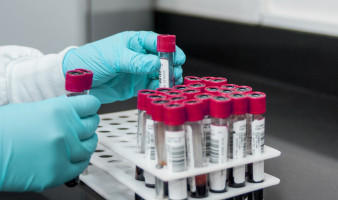
78 TNBC biopsies from patients with different responses to chemotherapy were analysed for API-5 expression before any treatment.
Further studies on API-5 expression and inhibition were performed on patient-derived TNBC xenografts, one highly sensitive to chemotherapies and the other resistant to most tested drugs.
Clinical analyses of the 78 TNBC biopsies revealed that API-5 was more markedly expressed in endothelial cells before any treatment among patients with chemoresistant TNBC, and this was associated with greater micro-vessel density.
Dr. Melanie Di Benedetto and Dr. Guilhem Bousquet said, "Apoptosis Inhibitor-5 (API-5) also called Anti-Apoptosis Clone 11 (AAC-11) is a 58-kDa nuclear protein highly conserved across species."
API-5 was originally identified as an anti-apoptotic protein in mouse fibroblasts and in human cervical carcinoma cell lines, in which API-5 significantly enhanced cell survival after serum deprivation or ultraviolet sensitisation.
In vitro, a decrease in API-5 expression sensitised human cancer cell lines to apoptosis, and increased their sensitivity to anticancer drugs.
In human osteocarcinoma cells, API-5 promotes survival through the inhibition of an E2 promoter-binding factor, and the integrity of the leucine zipper domain is required for the anti-apoptotic functions of API-5.
Previous authors engineered an anti-API5 peptide composed of the LZ domain fused with the Antennapedia/Penetrating protein domain since the integrity of this domain is essential for the function of API-5.
This LZ peptide is able to penetrate cells in vitro, and to cancel the API-5/acinus interaction.
In this pre-clinical study, the authors studied the expression of API-5 in patients with chemotherapy-resistant TNBC and the inhibition of API-5 in a resistant TNBC xenograft model.
The Benedetto/Bousquet Research Team concluded that Hypoxia is associated with drug resistance and they have previously demonstrated a link between cancer stem-cells, hypoxic niches and resistance to sunitinib in renal cell carcinoma.
In vivo, hypoxia has been shown to induce resistance to apoptosis in human cervical cancer cell lines through a selection of p53-mutated cells.
Source: Impact Journals
The World Cancer Declaration recognises that to make major reductions in premature deaths, innovative education and training opportunities for healthcare workers in all disciplines of cancer control need to improve significantly.
ecancer plays a critical part in improving access to education for medical professionals.
Every day we help doctors, nurses, patients and their advocates to further their knowledge and improve the quality of care. Please make a donation to support our ongoing work.
Thank you for your support.